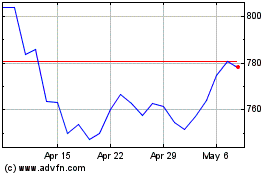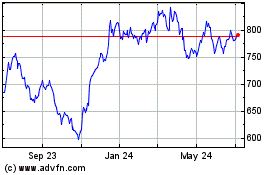Should the Bond Market Be More Honest? Some on Wall Street Say 'Yes'
November 18 2016 - 3:54PM
Dow Jones News
By Liz Hoffman
A group of banks, asset managers and corporate bond issuers
Friday proposed new guidelines to make debt sales more transparent
in the trillion-dollar market.
While it is unclear how widely adopted the guidelines will
become, the group endorsing them includes big banks such as Goldman
Sachs Group Inc. and UBS AG, investment giants such as BlackRock,
and companies such as Royal Dutch Shell and Vodafone PLC. It was
set up at the urging of the U.K. Treasury and Bank of England,
following a 2014 review of the fixed-income market after a series
of scandals.
The guidelines would, among other things, discourage banks from
doling out bonds to favored customers and would require them to
answer honestly when asked about the demand for a particular
security.
Bond sales are often a delicate negotiation laced with haggling
and half-truths, as banks try to raise funds for corporate clients
at the cheapest price possible, while still ensuring there is
enough leftover demand from investors to allow the bonds to trade
well.
The group, the FICC Market Standards Board, stands for
fixed-income, currencies and commodities, and is a catchall term
for the trillions of dollars in debt securities that are issued
each year.
Regulators have been scrutinizing how those securities are doled
out and priced. The Securities and Exchange Commission and Finra, a
brokerage-industry-funded regulator, in 2014 investigated whether
banks steered bonds to the biggest money managers, which would give
those accounts unfair influence over pricing and hurt smaller
investors.
A Finra spokeswoman and SEC spokesman declined to comment.
The proposals are aimed at European offerings, but over time
"market pressures will lead to this standard being adopted more
broadly internationally," Robert Rooney, who runs Morgan Stanley's
international business and worked on the guidelines, said in a
statement.
Essentially, Friday's proposals would require more honest
dealings from both the banks that underwrite these securities and
investors who buy them.
Bank disclosures about a deal's demand should be "not
misleading," said the proposal published by the group. Investors
sometimes complain that bankers gin up orders by suggesting
offerings are hotter than they are.
But investors also could be more upfront, the working paper
said. The guidelines said investor orders "should be a true
representation of their demand." Investors sometimes ask for more
bonds than they want because they fear getting none, industry
participants say.
That distorts true demand and can make for wobbly trading, which
reflects poorly on underwriters, the group said.
The proposal is a draft of suggested "best practices" and has no
enforcement mechanism if the participating banks don't follow the
guidelines.
Its success likely depends on companies insisting that their
banks adopt them. Royal Dutch Shell's treasurer said that the
company -- a major issuer of corporate debt -- "would like to see
all our syndicate banks and investors adopting this standard."
Still, corporations may not like the outcome of injecting too
much transparency into bond allocations. Forcing banks to be honest
when demand is weak could doom offerings altogether -- meaning
companies don't raise the money they are seeking, or have to pay
higher rates.
Write to Liz Hoffman at liz.hoffman@wsj.com
(END) Dow Jones Newswires
November 18, 2016 15:39 ET (20:39 GMT)
Copyright (c) 2016 Dow Jones & Company, Inc.
BlackRock (NYSE:BLK)
Historical Stock Chart
From Mar 2024 to Apr 2024

BlackRock (NYSE:BLK)
Historical Stock Chart
From Apr 2023 to Apr 2024
